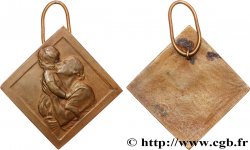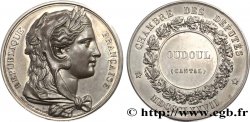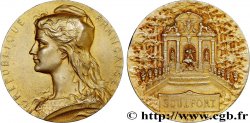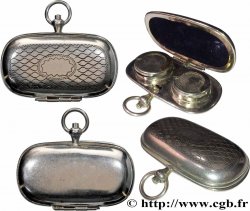fme_587142 - III REPUBLIC Médaille parlementaire, XIVe législature, Emile Faure
330.00 €
Количество
Добавить в корзину

Тип Médaille parlementaire, XIVe législature, Emile Faure
Дата: 1928
Монетный двор / Город: 37 - Indre-et-Loire
Металл: silver
Диаметр: 49,5 mm
Ориентация осей монеты: 12 h.
Гравер BÉNARD Raoul René Alphonse (1881-1961)
Вес: 62,13 g.
Век: lisse + corne d’abondance 2ARGENT
Пуансон: Corne 2 ARGENT
Редкость: R3
Комментарии о состоянии
Patine hétérogène. Traces d’un ancien nettoyage avec de petites taches noires. Présence de quelques coups et rayures
Лицевая сторона
Аверс: легенда: REPUBLIQUE - FRANÇAISE.
Аверс: описание: Deux allégories féminines se tenant la main, l’une tenant un faisceau de licteur, l’autre une branche de laurier, derrière à gauche un soleil au-dessous en deux lignes RAOUL / BÉNARD.
Обратная сторона
Реверс: легенда: CHAMBRE - DES DEPUTES // LIBERTÉ. ÉGALITÉ. FRATERNITÉ // EMILE FAURE / INDRE-ET-LOIRE.
Реверс: Описание: Fronton de l’Assemblée nationale ; au premier plan un cartouche reposant sur une branche de laurier et de une branche de chêne. À gauche du cartouche 1928, à droite un faisceau de licteur. Sur le cartouche est inscrit en reliefs en deux lignes .
Комментарий
Médaille attribuée en 1928 à Émile Faure en tant que député d’Indre-et-Loire. Il naquit le 16 février 1873 à Montélimar (Drôme) et décéda le 25 avril 1953 à Villejuif (Val-de-Marne). Il était administrateur du syndicat national des travailleurs des chemins de fer. Il fut député du département de l’Indre-et-Loire de 1910 à 1919 (Xe et XI législatures) puis de 1928 à 1936 (XIVe et XVe législatures). Il était inscrit auprès de groupes socialistes.








 Cообщить об ошибке
Cообщить об ошибке Распечатать страницу
Распечатать страницу Отправить мой выбор
Отправить мой выбор Задать вопрос
Задать вопрос Consign / sell
Consign / sell
 Информация
Информация










